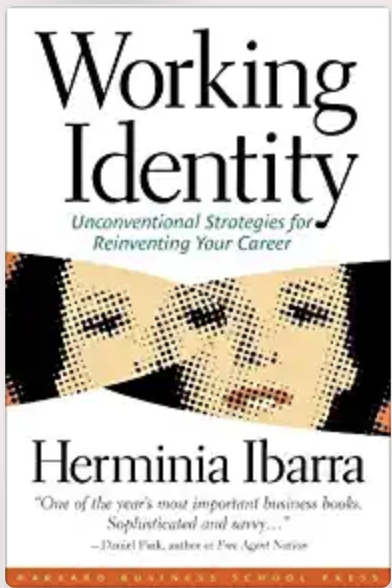Notes on “Working Identity”

“Working Identity: Unconventional Strategies for Reinventing Your Career” by Hermina Ibarra is a book oriented around case studies of people transitioning careers. At its heart, it has a reasonable methodology and it contains nuggets of wisdom that I think are useful …and maybe even “unconventional”. However, it shrouds this in a lot of talk about personal identity that felt less scientific and, like most books, repeated itself a lot in order to make it to book length.
The case-studies consist of stories derived from 39 non-random in-depth interviews. The people range from age 32 to 51. While Ibarra is clear in the methodological appendix that this was intended to capture people with work experience and not people with “mid-life crises”, I think all of these stories read as such crises, discussing people of immense resources and numerous career options struggling to figure out what they really want. It’s definitely a first-world problem, but luckily it is a very relatable one for me.
The people that Ibarra writes stories about were frequently more interesting to me than the attempts Ibarra made to weave all of this together into a particular framework. Some were simply intriguing, like Pierre who quit his job as a psychologist to become a Buddhist monk. Others resonated, like Gary who was a consultant who wanted more “meaning” in his career, and considered a range of “conformist” and “non-confirmist” jobs (e.g., a consultant at another company versus a scuba diving instructor) and ultimately was able to reconcile these positions as a manager at a less “conformist” company with a good culture.
However, looking at the case studies do show general principles that Ibarra is demonstrating. I was able to glean a general strategy that Ibarra is suggesting people follow for success at “finding yourself”:
- Finding out what you really want flows from what is important to you. Most people starting out in their career are looking for money and experience. However, most of the people in this book are struggling with the realization that they’ve already acquired all the money and experience they care to and are wondering what is next. Taking time to reflect from first principles what is important helps inform the criteria that can ground a search. You may realize that money is no longer necessary and you don’t need a high-earning career or you may realize that you want more autonomy and decide to strike it as your own boss. Or you may realize you do prefer money and structure. It really depends, but you got to think first.
- Time – and distance – away from work are important. Being in the office frequently traps you in a particular perspective that can be hard to escape (especially for managers trapped in endless back-to-back meetings with no time to think). Time away lets you reset and reflect more clearly. Ibarra suggests taking one break to recharge yourself and another break to reflect on your career.
- Introspection alone is insufficient for a career change – you must also experiment. While previously I’ve suggested using introspection to find out what is important to you and carving out time and distance in order to introspect, Ibarra suggests that introspection is actually only a small part of a career change. Instead, she suggests that most successful career changes are the result of experimentation where you encounter and try on the role (or an “identity” in Ibarra’s lexicon) and see what you think of it.
- You shouldn’t consider just one path. Ibarra suggests that our career search requires thinking of a list of multiple possibilities, some conventional and some unconventional, and trying them each out a little. Sometimes it takes a few tries of trying on roles in a limited, experimental scale before you land on the one that works best. As Ibarra notes, it is better to oscillate between holding on and letting go than come to a premature resolution.
- Make small steps toward a better path rather than one big leap. Ibarra argues that successful career changes involve slowly growing into a different role rather than one big change. This resonates with 80,000 Hours’s suggestion to avoid making one large 40-year long career plan and instead focus on making A-B-Z plans with near-term (i.e., 3-5 year) options.
- Find people who can emulate new roles and mentor you into them. Ibarra states that career changes are often too overwhelming to go alone and that successful changes involve social support. This frequently involves connecting with someone already in the role who can emulate it for you and potentially even aid you in transitioning you into that role. Ibarra also argues that these people are best found outside your typical social circles. Paradoxically, those closest to you frequently pigeonhole you into particular roles and can unintentionally hinder your growth.
- If you don’t have time for side-projects, consider saving money and quitting to do a full-time search. Education – such as grad school or a retraining program – can be a good path to pursue while also searching. When discussing these transitions, Ibarra kind of assumes you are a person of immense resources and opportunities, so this may not be realistic for most people.



